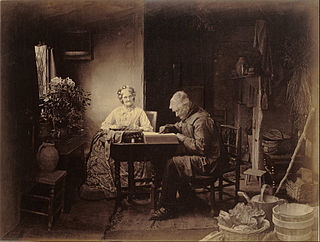A Quote by Christian Nestell Bovee
He must put his whole life into his work, who would do it well, and make it potential to influence other lives.
Related Quotes
If he [the Artist] were to take up the pen it would be...to better express his individuality and explain it to others; or else to put his internal affairs in order...to deepen and sharpen his relationship with his fellow men because other souls exert an immense and creative influence on our soul; or to try to fight for a world as he would like it to be, for a world that is indispensable to his life.
With only one life to live we can't afford to live it only for itself. Somehow we must each for himself, find the way in which we can make our individual lives fit into the pattern of all the lives which surround it. We must establish our own relationships to the whole. And each must do it in his own way, using his own talents, relying on his own integrity and strength, climbing his own road to his own summit.
What a wee little part of a person's life are his acts and his words! His real life is led in his head, and is known to none but himself. All day long, the mill of his brain is grinding, and his thoughts, not those of other things, are his history. These are his life, and they are not written. Everyday would make a whole book of 80,000 words -- 365 books a year. Biographies are but the clothes and buttons of the man -- the biography of the man himself cannot be written.
Many are the lives of men unwritten, which have nevertheless as powerfully influenced civilization and progress as the more fortunate Great whose names are recorded in biography. Even the humblest person, who sets before his fellows an example of industry, sobriety, and upright honesty of purpose in life, has a present as well as a future influence upon the well-being of his country; for his life and character pass unconsciously into the lives of others, and propagate good example for all time to come.
Our work is not to save souls, but to disciple them. Salvation and sanctification are the work of God's sovereign grace, and our work as His disciples is to disciple others' lives until they are totally yielded to God. One life totally devoted to God is of more value to Him than one hundred lives which have been simply awakened by His Spirit. As workers for God, we must reproduce our own kind spiritually, and those lives will be God's testimony to us as His workers. God brings us up to a standard of life through His grace, and we are responsible for reproducing that same standard in others.
Genius in the poet, like the nomad of Arabia, ever a wanderer, still ever makes a home where the well or the palm-tree invites it to pitch the tent. Perpetually passing out of himself and his own positive circumstantial condition of being into other hearts and into other conditions, the poet obtains his knowledge of human life by transporting his own life into the lives of others.
An actor must interpret life, and in order to do so must be willing to accept all the experiences life has to offer. In fact, he must seek out more of life than life puts at his feet. In the short span of his lifetime, an actor must learn all there is to know, experience all there is to experience, or approach that state as closely as possible. He must be superhuman in his efforts to store away in the core of his subconscious everything that he might be called upon to use in the expression of his art.
How beautifully is it ordered, that as many thousands work for one, so must every individual bring his labor to make the whole! The highest is not to despise the lowest, nor the lowest to envy the highest; each must live in all and by all. Who will not work neither shall he eat. So God has ordered that men, being in need of each other, should learn to love each other, and bear each other's burdens.
Listen, children: Your father is dead. From his old coats I'll make you little jackets; I'll make you little trousers From his old pants. There'll be in his pockets Things he used to put there, Keys and pennies Covered with tobacco; Dan shall have the pennies To save in his bank; Anne shall have the keys To make a pretty noise with. Life must go on, Though good men die; Anne, eat your breakfast; Dan, take your medicine; Life must go on; I forget just why.
I personally claim no special insight into Satan's methods, but I have at times been able to identify his influence and his actions in my life and in the lives of others. When I was on my first mission, Satan sought to divert me from my future path and, if possible, to destroy my usefulness in the Lord's work.



































